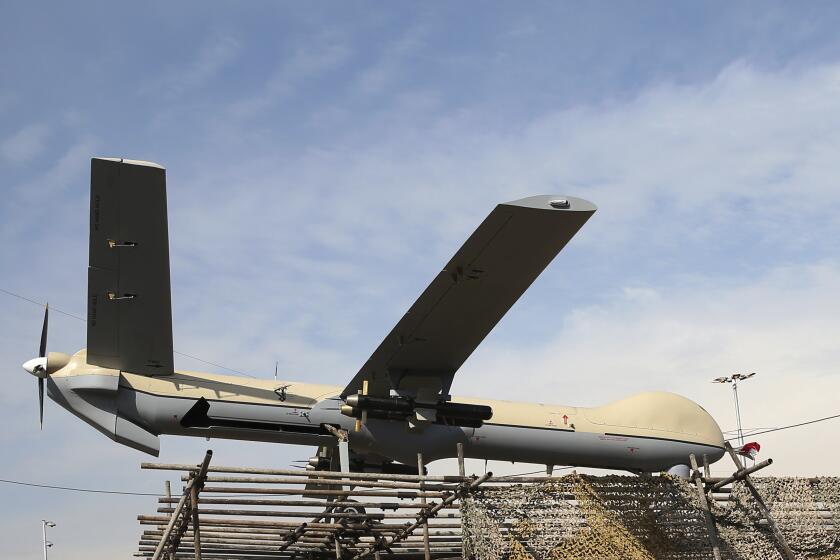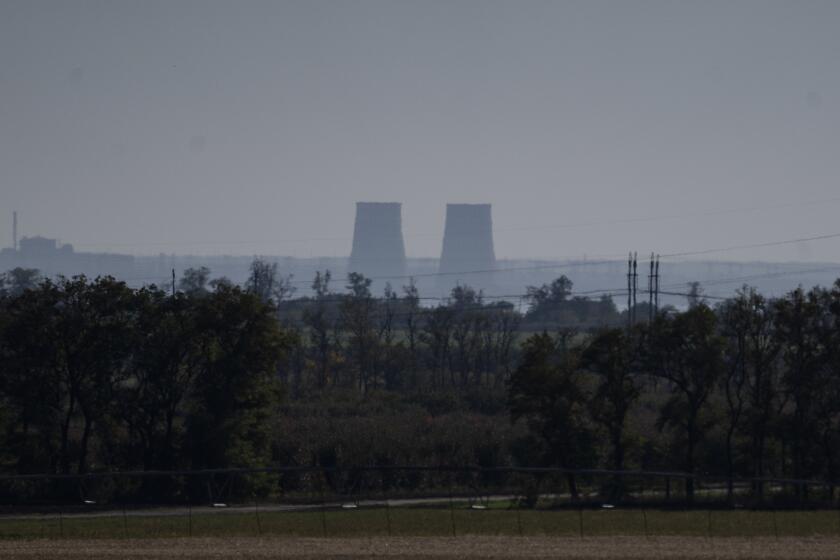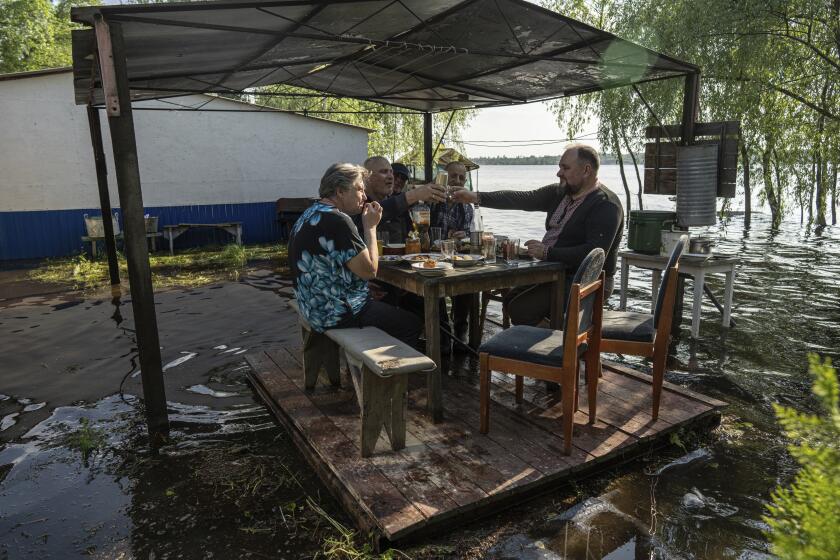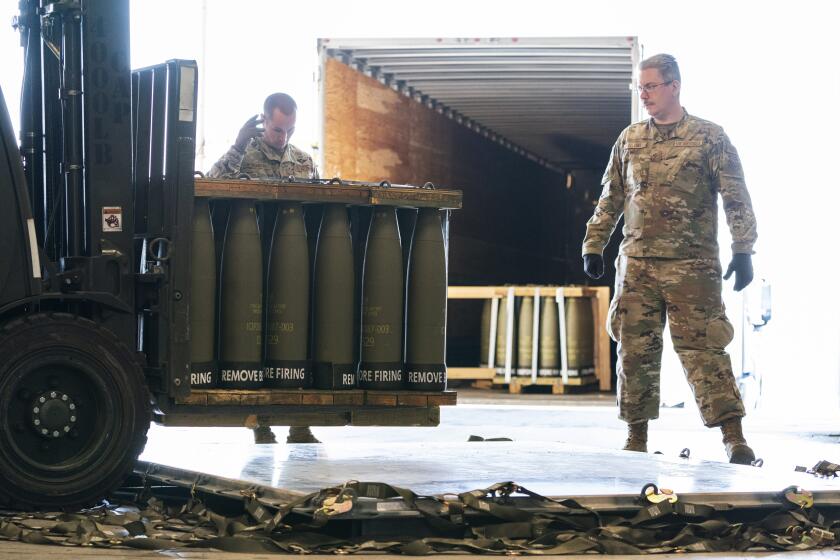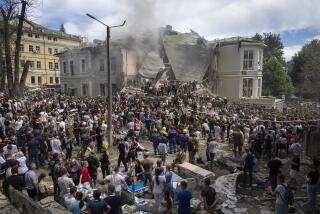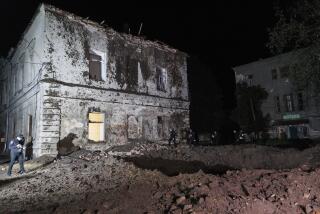Sleepless in Kyiv: Nighttime Russian air campaign terrorizes Ukraine’s capital
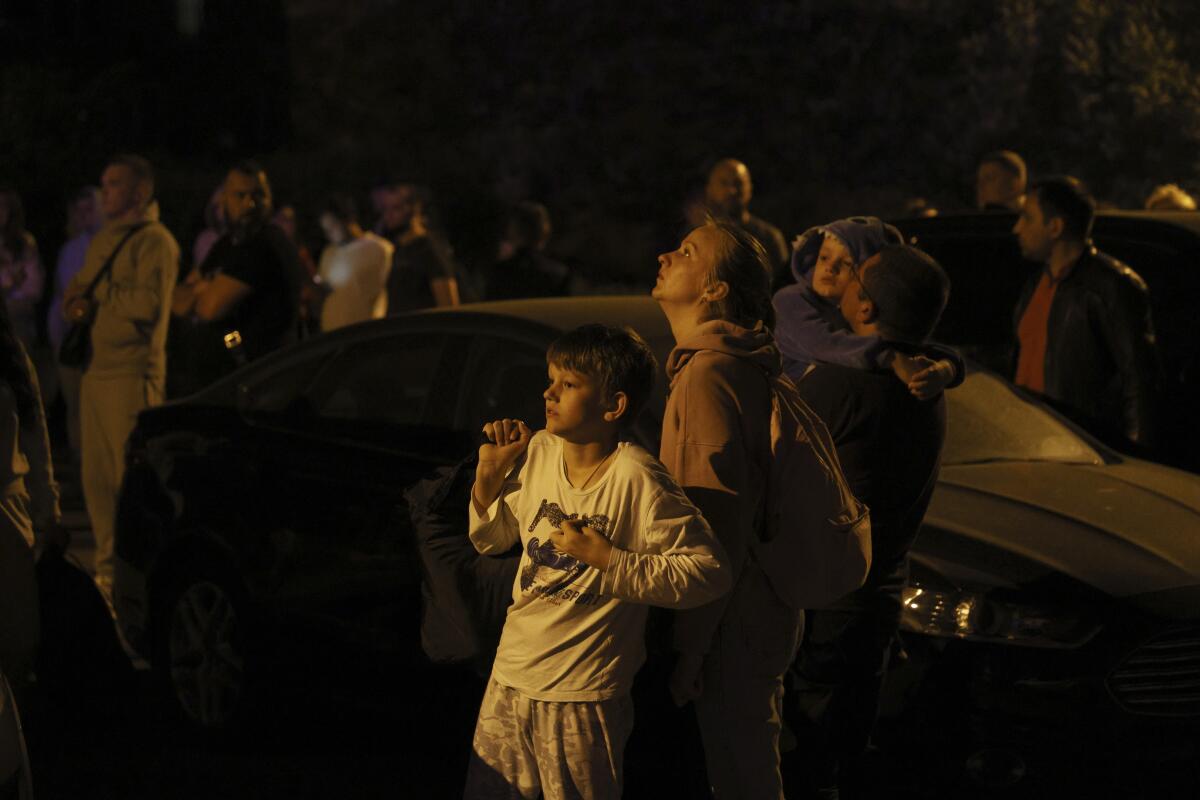
- Share via
KYIV, Ukraine — The attacks come at night, when most in Kyiv are sound asleep. The sirens wail across the Ukrainian capital, rousing bleary-eyed residents, who, after 15 months of war, have customized their individual routines to cope with Russia’s latest air campaign.
In the recent escalation of Russian attacks, Olha Bukhno, 65, a cleaner, says a prayer every night. “Please,” she asks, closing her eyes and addressing the heavens, “let it be quiet.”
By her bedside is a bag packed full of essentials: documents, dry foods and water. At the sound of the alarm, she dashes downstairs to her building’s basement and takes shelter. Nearly two weeks ago, debris from a shot-down missile landed on the roof of a building next to hers in Kyiv’s Darnytsia district, causing a large fire.
“Every night, we are afraid,” she said, tearing up.
When the alarm blares, some in the city are consumed by fear, imagining the worst-case scenarios that could unfold: displacement, being trapped under rubble, being killed. Others embrace stoicism, lying awake in bed as the sounds of explosions ricochet across the skies.
But in the last month, when Russian air attacks escalated to near-nightly raids, most people are complaining of sleeplessness. In the war-defying bustle of Kyiv’s cafes, restaurants and salons, business goes on despite the ongoing war, but everyone has a story about how tired they feel.
Russia attacks Kyiv with dozens of drones as the city prepared to mark the anniversary of its founding Sunday. At least one person was killed.
“What is there to say? Everyone is exhausted,” said Oleksandr Chubienko, a pharmacist in Darnytsia, describing the recent temper of his customers.
Russia launched another wave of attacks on Kyiv in the early hours of Monday using a combination of drones and cruise missiles. More than 40 air targets were brought down in what was the 15th nighttime attack on the capital in May, said Serhii Popko, head of the Kyiv Military Administration, in a Telegram update. Falling debris broke through the roof of a residential building in the Podlisk district, but there were no immediate reports of casualties.
“One more difficult night for the capital,” said Kyiv Mayor Vitali Klitschko.
Often the explosions are the sounds of Ukraine’s air-defense systems successfully targeting the deadly mix of missiles and drones Russia has sent into Ukraine. On May 16, Russia launched an exceptionally intense bombardment, sending 18 missiles Ukraine’s way, 14 of which targeted Kyiv, according to Ukraine’s air force spokesman. Ukraine said it shot down six hypersonic Kinzhal missiles that night, a capability it did not have last year.
Ukraine’s air force claims to have downed a Russian hypersonic missile over Kyiv using newly acquired American Patriot defense systems.
On Saturday night, local officials in Kyiv said that Ukraine’s capital was subjected to the largest drone attack since the start of Russia’s war. At least one person was killed. It came on the eve of Kyiv Day, which marks the anniversary of the city’s founding.
The increasingly regular series of strikes are part of a new Russian air campaign targeting Ukrainian counteroffensive capabilities, experts and Ukrainian officials said. The uptick was noticed after April 19, right after Ukraine announced that it had received American-made Patriot missiles, a long-sought new shield against Russian airstrikes. Observers said the renewed intensity of Russian attacks appears to be aimed at overwhelming and targeting these new systems.
The May 16 attack caused “minor” damage to one Patriot air-defense system near Kyiv, U.S. officials said, adding that it was still operational.
The latest string of attacks also comes after a previous wintertime escalation in air raids this year targeted critical infrastructure, including power stations and military logistics facilities. Ukrainian forces have become more effective in shooting down Russian missiles compared with earlier in the year, with many crediting the American systems.
News Alerts
Get breaking news, investigations, analysis and more signature journalism from the Los Angeles Times in your inbox.
You may occasionally receive promotional content from the Los Angeles Times.
But the defense systems can’t shield civilians from every harm. The debris from destroyed Russian missiles has rained down on civilians, causing fires and injuries.
For many in the city, the sound of the air-raid alarm is accompanied by the constant ring of Telegram, the preferred app in Ukraine for sharing updates about the airstrikes. With every update — “Another coming from east,” “More launched from sea! Take cover!” — people respond with an emoji expressing expletives.
But the calculations that civilians make about what to do next is often very different across various walks of life, with some staying at home, resigned to their fate, and others speeding toward safer spaces.
In Darnitsya, leftover debris from the fire was piled inside a large garbage can. Charred pieces of wood and insulation sit under the springtime sun, as parents stroll by with their children and neighbors exchange the latest gossip.
Ukraine’s military intelligence claims that Russia is plotting a ‘large-scale provocation’ at a nuclear power plant designed to put hostilities on pause and give Moscow’s forces a respite.
Pavlo Chervinskyi, 45, tells his 4-year-old daughter that it’s all a game when their apartment windows rattle with the distant boom of the nighttime explosions. Every time there is an air raid, he carries her to the corridor and waits for the all-clear.
With every bang, he tells her that “Putin is making a racket again,” referring to Russian President Vladimir Putin. It’s better than to try to explain to her what is really going on, he said, watching her make sand castles in the family’s neighborhood playground. It’s not exactly a lie, he explained. “We are being subjected to a game of Russian roulette every night.”
But still, it’s better to avoid telling his child the whole truth. “It’s better that it’s a joke between us,” he said. “Now she is used to it, and she isn’t afraid.”
She slept right through the weekend attacks, her father said. “At least someone is getting rest,” he added, with a weary smile.
Damage that has gone unrepaired for months at a Russian-occupied dam is causing dangerously high water levels in a reservoir in southern Ukraine.
Mariana Yavolina, a physical therapist, had the misfortune of moving to the residential compound in Darnitsya the day of the attack. She returned to her new apartment after midnight that night. The air-raid alarm was wailing, but Yavolina had had enough.
She lay on her sofa and looked up at the ceiling, her first moment’s rest from the long day. In the distance, explosions resounded.
One, then another. She looked at her Telegram app for updates.
“I try not to take it so seriously,” Yavolina said. “It’s so annoying, and if you want to live yourself you can’t be consumed by it all the time.”
Half of the people in the U.S. support the Pentagon’s ongoing supply of weapons to Ukraine for its defense against Russian forces.
Bit by bit that night, she convinced herself that it was OK to sleep.
The next blast shook the entire apartment, jolting her awake. Outside, plumes of smoke clouded the view as flames raged from the roof of the building beside her. The stench of burning was overwhelming.
Soon, firefighters and police arrived at the scene, forbidding anyone to take video of the wreckage. But Yavolina filmed anyway and sent the video to a friend serving in the army.
“Just flowers,” he responded — a local idiom meaning that it could have been much worse.
More to Read
Sign up for Essential California
The most important California stories and recommendations in your inbox every morning.
You may occasionally receive promotional content from the Los Angeles Times.
